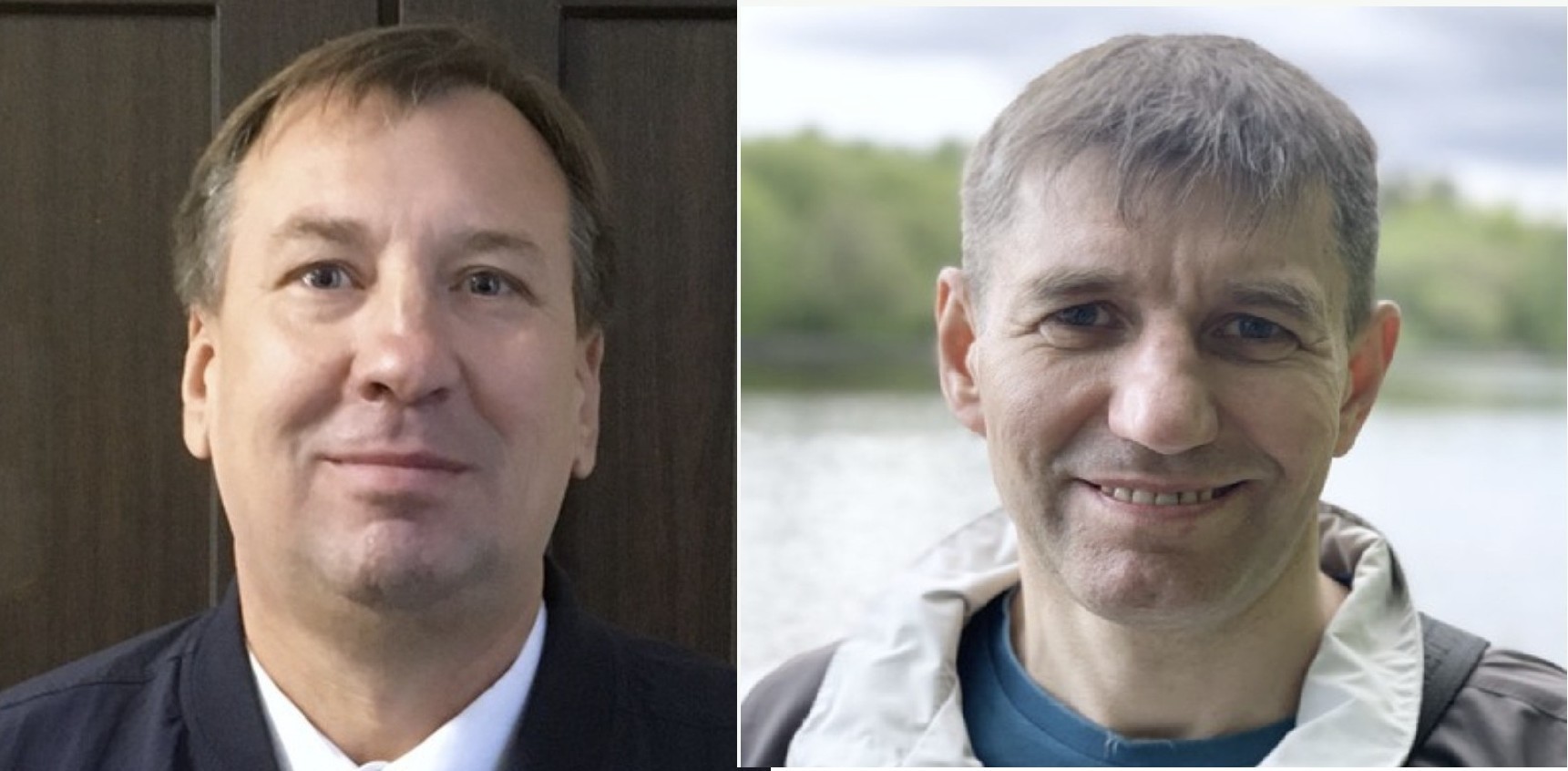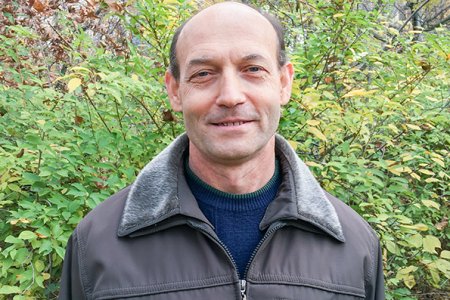
An occupation Crimean ‘court’ has upheld six-year terms of imprisonment passed against Victor Kudinov and Serhiy Zhyhalov for practising their faith as Jehovah’s Witnesses. The fact that such an outcome was anticipated only accentuates the need for maximum attention to Russia’s mounting persecution of believers in occupied Crimea, especially given the certainty that the same repression will be extended to all Ukrainian territory while under Russian occupation.
Viktor Kurdinov (b. 1969) and Serhiy Zhyhalov (b. 1971) had both appealed against the 6-year sentences handed down on 14 January 2025 by ‘judge’ Serhiy Korotun from the occupation ‘Gagarin district court’, The two men have been in custody ever since that ruling and were forced to take part in the appeal hearing on 11 June by video link from SIZO [remand prison].
Crimean Process reports that ‘judge’ Yelena Yelanskaya from the occupation ‘Sevastopol municipal court’ did not, at least, try to prevent people from attending the hearing on 11 June. Several dozen visitors were admitted, with it very likely that most of these were fellow believers who had, as during the sentencing on 14 January, ignored the danger and come to show their solidarity.
The defence pointed to the lack of any proof that Kudinov and Zhyhalov had had anything to do with the formal activities of the ‘organization’, and to the results of an independent psycholinguistic analysis of the recordings of services which found no whiff of so-called ‘extremism’.
As reported, Kudinov and Zhyhalov were charged with ‘organizing the activities of an extremist organization’ under Article 282.2 § 1 of Russia’s criminal code. Both prosecutor and ‘judge’ Serhiy Korotun proved willing to accept that peaceful meetings where believers studied Biblical passages; prayed and sang together were ‘the activities of an extremist organization’. The prosecutor had claimed that the ‘proof’ of Kudinov and Zhyhalov’s role as ‘organizers’ lay in the fact that the two men had given other participants tasks, invited them to answer and had also thanked them for their responses. This was clearly accepted by Yelenskaya since she left the earlier verdict and sentences unchanged.
While there can be no excuse for complicity in such judicial travesties, the root of all such charges lies in a Russian supreme court ruling from 20 April 2017. This gave the green light to Russian ‘trials’ and imprisonment of Jehovah’s Witnesses by labelling them ‘an extremist organization’. While ‘investigators’ in occupied Crimea base such persecution on the same type of fake ‘expert assessments’; illicitly taped meetings and ‘secret witnesses’ as in other cases of persecution, all of this is aimed solely at ‘proving’ what the men and women never deny – their religious faith as Jehovah’s Witnesses. In the case of Kudinov and Zhyhalov, it would seem that the prosecution, initiated by ‘senior investigator M.Ye. Ukrainsky, was based on the ‘testimony’ of a ‘secret witness’ who has been identified as Nadezhda Dykman. There was another alleged ‘witness’ for the prosecution, an individual called S.B. Korkushko. During one of the hearings, Zhyhalov noted that he had never met this Korkushko, but was aware that he had, over the past five years, ‘testified’ in many prosecutions of Crimean Jehovah’s Witnesses. The same situation is observed with respect to Russia’s persecution of Crimean Tatar civic journalists and activists, and other Crimean Muslims, with the ‘evidence’ for massive sentences of up to 20 years based on ‘secret witnesses’ known to be used in multiple trials.
Russia’s harassment of Jehovah’s Witnesses, like that of essentially all believers, except those linked with the Russian Orthodox Church, began soon after its invasion and annexation of Crimea. Arrests of Jehovah’s Witnesses began less than a year after the April 2017 Supreme Court ban, and it is increasingly difficult to keep up with the number of victims of repression.
Vitaliy Buryk (Kerch)

Armed enforcement officers turned up at the homes of at least ten Jehovah’s Witnesses in occupied Kerch on 9 October 2024 and carried out searches. Criminal charges were laid against one believer, Vitaliy Buryk (b. 7.10.1971). He is accused of ‘organizing the activities of an extremist organization’, under Article 282.2 § 1 of Russia’s criminal code He was initially held in custody for two days, and is now under house arrest.
Tamara Bratseva

Five armed searches were carried out on 5 August 2024, with the FSB reported to have used particularly brutality in many cases. In Rozdolne, armed officers also turned up at one person’s work, forcing him, facedown, to the floor and binding his hands with a cable tie so tightly that he was later forced to turn to an injury unit. The latter confirmed his injury, but the medical record was then taken from him at the police station.
Criminal charges, also under Article 282.2 § 1, were laid on that occasion against Tamara Bratseva (b. 28.09.1955), from Rozdolne. She is currently under a signed undertaking, but could also face a long sentence
Oleksandr Voronchykhin (b. 1963); Yekaterina Demidova (b. 1956); Oleksandr Kotylets (b. 1977) and Dmytro Zakharevych (b. 1995)
All three men are charged with the more serious ‘organizing the activities of a so-called extremist organization’ (under Article 282.2 § 1) while Demidova is accused of ‘participation’.
Earlier cases
The first arrest was of Serhiy Filatov (b. 1972) after armed raids in Dzhankoi during the night from 15-16 November 2018. He too was accused of ‘organizing the activities of an extremist organization’ under Article 282.2 § 1 with the ‘prosecutor claiming that the Jehovah’s Witness had “undermined the foundations of the constitutional order and the security of the state”, by, purportedly, being the leader of a religious organization. On 5 March 2020, he was sentenced by ‘judge’ Maria Yermakova from the occupation ‘Dzhankoi district court’ to six years’ imprisonment in a medium security prison colony, with this upheld by Edward Belousov from the ‘Crimean high court’ on 26 May 2020.
Artem Gerasimov (b. 1985) from Yalta was arrested during a second wave of armed raids on 20 March 2019. He too is serving a six-year sentence, imposed at appeal level after the first instance ‘court’, also on 5 March 2020, imposed ‘only’ a massive fine. It is possible that Moscow was still watching international reaction to such shocking religious persecution on occupied Ukrainian territory and preferred not to have two long sentences passed on one day.
Viktor Stashevsky (b. 1966) was sentenced by ‘judge’ Pavel Krylo from the occupation ‘Gagarin district court’ on 23 March 2021 to six and a half years’ imprisonment on the same ‘organizing extremist activities’ (Article 282.2 § 1 ) charge, and taken into custody in the courtroom. The sentence was upheld on 10 August 2021 by ‘judge’ Vladimir Avkhimov from the ‘Sevastopol municipal court’.
In a very worrying move, Stashevsky recently became the first Jehovah’s Witness from Russia or occupied Ukraine to have his sentence escalated, with a ‘court’ in Russia sending him to a prison, the worst of Russia’s penal institutions for part of the sentence.
Igor Schmidt (b. 1972) was sentenced by ‘judge’ Liudmyla Tumaikina from the same ‘Gagarin district court’ to six years, with this upheld on 17 January 2022.
Artem Shabliy (b. 1990) was initially arrested on 26 May 2020 after armed men burst into his home and caused injuries to one of his two small children by quite unnecessarily breaking a window during the raid. He was, at least, charged with ‘participation in an extremist organization’ (under Article 282.2 § 2) and was, on 16 February 2022, given a two-year suspended sentence by ‘judge’ Iryna Altanets from the ‘Kerch municipal court’.
Volodymr Maladyka (b. 1963), Volodymyr Sakada (b. 1970) and Yevhen Zhukov (b. 1969) were sentenced on 6 October 2022 by ‘judge’ Olga Berdnikova from the ‘Nakhimovsky district court’ in Sevastopol to six years’ imprisonment with this upheld by Gennadiy Vladimirovich Nikitin and two other ‘judges’ from the occupation ‘Sevastopol municipal court’ on 11 October 2023.
Oleksandr Dubovenko (b. 1973) and Oleksandr Lytvyniak (b. 1960) were sentenced on 1 December 2022 to six years’ imprisonment, with this demanded by demanded by prosecutor Minigul Saldykova and passed by ‘judge’ Tatiana Fedeneva from the ‘Armiansk municipal court’. The main ‘evidence’ against them was a Zoom conversation about the Bible, with this claimed to constitute ‘‘organizing the activities of an extremist organization’ (Article 282.2 § 1). Both men had been held under house arrest for over a year, and were taken into custody after the 6-year sentence,
There have been a few surprises, such as with respect to long sentences passed against Taras and Daria Kuzio, Serhiy Liulin and Petro Zhiltsov by ‘judge’ Vladimir Romanenko from the ‘Yalta municipal court’ on 27 February 2023. The sentences were overturned on 21 March 2024 by the ‘Crimean high court’, although this does not necessarily mean an end to persecution as the ‘case’ was sent back for retrial. The ‘court’ did, however, order the release from imprisonment of Taras Kuzio (b. 1978); Petro Zhiltsov (b. 1987) and Serhiy Liulin (b. 1984) with Daria Kuzio (b. 1982) having received a suspended sentence. Worth pointing out here, since Taras and Daria Kuzio have two small children, that a suspended sentence can become ‘real’ should a person be deemed to have ‘re-offended’. If believers are imprisoned for studying the Bible and religious worship, the occupation regime can decide at any moment that their continued faith constitutes ‘reoffending’.
Yury Herashchenko and Serhiy Parfenovych were also accused of ‘organizing the activities of an extremist organization’ but received suspended 6-year sentences from the occupation ‘Krasnohardiiske municipal court’ on 1 July 2024. These, however, were changed into real sentences on 5 October 2024.
Maksym Zinchenko was found ‘guilty’ of participation in what Russia has called an ‘extremist organization’ for practising his faith. The sentence passed by ‘judge’ Valery Kuznetsov from the occupation ‘Nakhimovsky district court’ in Sevastopol was significantly lower than that demanded by the prosecutor and it is not clear whether it was challenged. On 17 April 2024, Kuznetsov sentenced Zinchenko to two years’ imprisonment, however he then applied a norm on making a sentence more lenient, and instead of imprisonment, ordered two years of compulsory labour, as well as restrictions on certain activities.
Tadevos Manukian (b. 1981) was initially charged (with ‘organizing a so-called extremist organization’ under Article 282.2 § 1 together with Taras Kuzio and the others. His prosecution was, however, made into a separate ‘case’.
Dmytro Naukhatsky (b. 1969) has been under house arrest since December 2022, when he was arrested after the FSB carried out mass armed raids of at least 16 homes of believers in Simferopol. He was initially charged with ‘organizing the activities of a so-called extremist organization’ (under Article 282.2 § 1), however on 24 March 2023, the same ‘investigator’, V.A. Novikov added a charge of ‘financing the activities of an extremist organization’ (Article 282.3 § 1).



